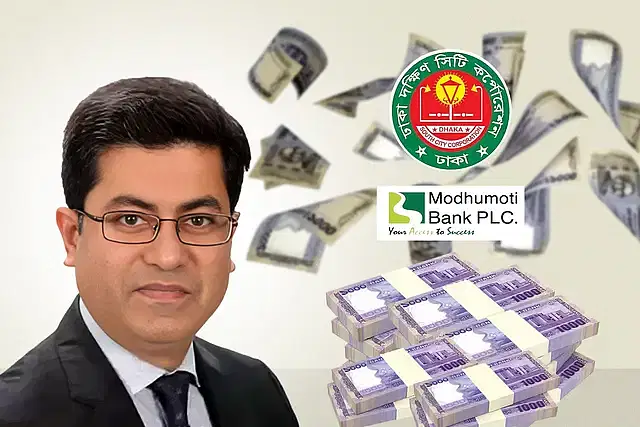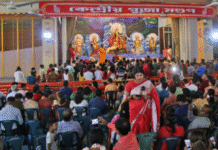
The Modhumoti Bank is unusually taking time to refund the money that the Dhaka South City Corporation (DSCC) deposited as fixed deposit receipt (FDR).
Officials alleged that the bank is not returning the money despite the city corporation’s repeated verbal and written requests.
Against this backdrop, the DSCC authorities are struggling to repay the security money (mortgage) to contractors of development projects. It is eventually disrupting the ongoing projects.
According to the DSCC accounts department sources, the city corporation used to deposit around 50 per cent of its annual revenue in Modhumoti Bank since the assumption of Sheikh Fazle Noor Taposh as its mayor during the ousted Awami League regime.
In the fiscal year 2024–25, the DSCC kept around 46 per cent of its total deposits – around Tk 5.43 billion – in the form of FDR, in addition to another Tk 4.23 billion of different projects kept as regular deposits in the Modhumoti Bank.
However, Taposh went into hiding following the political changeover in August.
Currently, the DSCC holds a total of Tk 11.57 billion in fixed deposits in different banks, with Tk 3.23 billion in Modhumoti Bank as of January. Of the Modhumoti Bank amount, Tk 1.45 billion is contractors’ security money and Tk 1.78 billion of fixed deposits is earmarked earnings from different sources, including market fees and general funds.
Some DSCC officials said Taposh used to delay contractor payments and security deposit refunds and keep the amounts in Modhumoti Bank. Following the Awami League regime’s ouster on 5 August last year, the city corporation started clearing outstanding contractor payments and bills, necessitating the withdrawal of funds from the banks.
As per instructions of the DSCC administrator, a letter was sent to Modhumoti Bank on 10 December, requesting withdrawal of Tk 1.44 billion. But the bank delayed the transaction and eventually paid Tk 1.36 billion in five installments, with Tk 80 million still pending.
DSCC chief executive officer Mohammad Bashirul Haque Bhuiyan said Modhumoti Bank is stalling the payments and killing time with various pretexts. The banks’ senior officials were summoned to learn about their perspective, but they did not turn up. They are only providing assurances.
He also noted that the bank is obliged to return the fund whenever it is sought. Now, the city corporation will take the issue to the court if the bank continues to delay.
However, the bank’s deputy managing director, Kamrul Hasan Khan, said the DSCC claims are not true. The payments are being made in phases. Since August, around Tk 2 billion has been disbursed.
Modhumoti Bank was established in 2013, alongside nine other banks approved by the Awami League government out of political considerations. Sheikh Fazle Noor Taposh, a key founder of Modhumoti Bank, is the son of a cousin of former prime minister Sheikh Hasina and has still been a director of the bank.
The bank was popularly dubbed as Taposh Bank. Under Taposh’s tenure as mayor, DSCC funds were deposited in 10 branches in Dhaka and Keraniganj, including those at Mitford, Motijheel, Bangshal, Dhanmondi, Uttara, Aganagar, Gulshan, VIP Road, Banglamotor, and Pragati Sarani.
Besides, the majority of house taxes and trade licence fees were collected through the Modhumoti Bank. Six booths were established in DSCC offices during Taposh’s term.
As of 5 August, the DSCC had a deposit of Tk 9.66 billion in Modhumoti Bank, including fixed deposits and project-related funds. To keep the funds, the city corporation used to delay the development projects and refrain from paying the contractors. Nobody could raise their voices in this regard due to an environment of fear.
Mustafa Kamal Mujeri, executive director of the Institute for Inclusive Finance and Development, said the delay in returning DSCC deposits exposes the fragile state of the banking sector. The bank might delay the repayment as it might face significant constraints in its operations due to a full and prompt repayment.
The Bangladesh Bank, as the regulator, should take strict actions against banks that delay repayments, in addition to other initiatives to improve their financial health.
prothom alo









